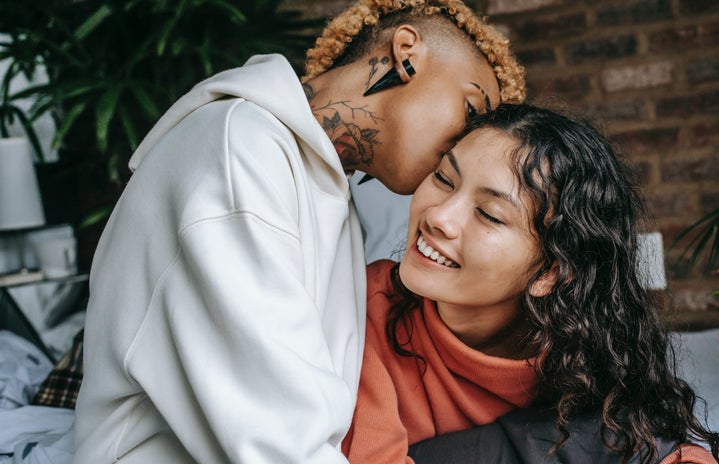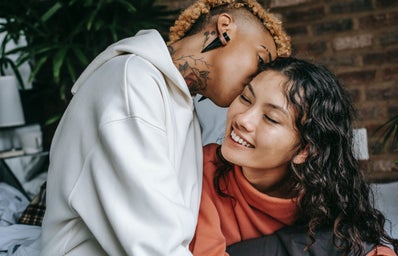Given the notoriety of college hookup culture, Gen Z hasn’t necessarily been taught how to navigate a relationship that survives after the honeymoon phase, or even necessarily inclined to want one. But with shifting attitudes toward dating culture brought on by the COVID-19 pandemic, more Gen Z couples have started to stick it out for the long haul. And given that one in four engaged Gen Z couples met their soulmate in college, according to 2020 data obtained by The Knot, you may be putting yourself under major pressure when it comes to figuring out how to sustain a long-term relationship with your new SO.
Falling in love can be one of the best experiences, and can even be addictive, especially when combined with the freedoms that come with going to college. But it can also be accompanied by anxiety — because you’re afraid of losing the intoxicating feeling of attraction, as well as losing the person you’ve been with for so long. Here’s something all those rom-coms don’t prepare you for: You probably will lose that intoxicating feeling. However, that doesn’t mean real, deeper love doesn’t exist. In fact, a solid foundation supports a long-term relationship. Here’s a few reasons why infatuation, or being “in love,” isn’t the same as love itself — and why real love can be better.
- YOUR EUPHORIA WILL FADE
-
No matter how exciting your relationship seems, the euphoria of falling in love is bound to fade in time. Think about this: falling in love is literally a state of intoxication. A 2017 study published in Philosophy, Psychiatry, & Psychology shows that romantic love creates neuropathways for love addictions and unhealthy relationships. Love also changes the chemical balance within your brain by spiking oxytocin, dopamine, adrenaline and norepinephrine to cause a “high” sensation of euphoria, according to CNN.
Despite this initial reaction, the hormones that make you giddy every time your partner says your name won’t be circulating with such speed forever, and you’ll start to come down from cloud nine after a while. You’ll be able to settle into a natural routine of talking on the phone after study sessions at your university’s library, going on dates, or staying in for take-out without feeling lovesick, and that’s okay. Don’t take it as a sign that your relationship won’t make it through the adjustment period of going to college. It’s a new opportunity to learn how to live together and get a taste of your shared future.
Leslie Montanile, a marriage lawyer and relationship expert, agrees. “Being ‘in love’ is an explosive, exciting butterfly feeling that has you on a constant roller coaster ride,” she tells Her Campus.
She continues, “While for some, this sensation is exhilarating and fulfilling, for most, it is simply fleeting and oftentimes destructive when it does not transform into the more profound, satisfying feeling and bond of LOVE,” which Montanile defines as “a deep-rooted knowing and unconditional feeling of connectivity with the one you are with. The bond of trust is unspoken and unshakeable between you and your partner.”
- there’s room for TRUST to GROW
-
Trust is a great way to tell the difference between loving your significant other and being “in love.” Long-term relationships succeed when both partners commit themselves to transparency. Trust will grow and strengthen your relationship if you both remain honest with each other.
Maria, 23 and a recent Kent State graduate, says that trust is a key part of her seven-year relationship. “There is no better feeling than the safety and security that comes with dating your best friend,” she says.
If your new class schedule or routine is stressing you out, let your partner know. Otherwise, you might unknowingly take your stress out on them by fighting more or seeming distant. You could also find new ways to communicate, like making Finstas just for the two of you to share cute updates about your day. Think about how you communicate now and how that can adapt to help your trust grow by strengthening your communication.
It takes work from both parties to make sure nothing breaks that trust. Keeping the same desire to remain truthful with each other can build lasting love.
- arguments can make you stronger
-
Many people think that being in love doesn’t last because, eventually, you’ll have a few fights. The pink haze that made you starstruck around your partner has likely already dissipated. Don’t panic by counting how many fights you have every week. Experts agree there’s no correct formula to discover how many arguments healthy couples should have every month. The important part is relying on your lasting love to move forward and learn from those fights.
Jenn, a recent college graduate, has been in a long-term relationship for six years, says some fighting is only natural. “Not having a fight means that you two are literally carbon copies or each other (and that’s weird) or you’re not communicating (and that’s bad),” she says. “People always think that fights lead to breakups, but I truly think that fights strengthen communication and your relationship.”
Maria agrees. “When we have fights, I know it won’t result in a break-up or anything truly harmful,” she tells Her Campus. “We often fight because we want to help each other see relationship blind spots, or we have just had long days and snap something really small and stupid that we forget about the next day.”
Working through your disagreements while maintaining trust is key. People who only want the chase aren’t likely to stick around to work on the relationship. You need to bring that effort to the table every day; it’s the best way to avoid writing your own Olivia Rodrigo-inspired breakup song in your dorm room.
- YOU can LEARN TO APOLOGIZE
-
After the occasional fight, it can be helpful to keep an open mind and learn to apologize. Being kind can sometimes be more important than being right.
Viral videos make it look like arguments are a sign you should leave, but that isn’t always true. They can simply be a sign that your communication needs work and an apology is in order. Apologies can be more complex than they seem and may require specific language.
Your partner probably won’t feel like everything’s okay if you make non-apologies by deflecting blame or using accusatory words. Taking responsibility and seeking compromises can help both partners feel valued. In a mature relationship, both partners should be willing to admit fault, apologize, and work together on moving forward.
- BUTTERFLIES can BECOME WARM FUZZIES
-
Though it’s great when your heart flutters after falling head over heels for your partner, it’s usually a response to their newness and mystery. Yet if you get to know them and realize it’s not a match, they’ll probably go away — and even when you deeply love your partner, those fluttering feelings from the novelty of a new relationship will likely fade in time.
Dr. John De Oca, relationship expert and coach, describes the first phase of love as a rollercoaster ride.
“When one begins a relationship that is fueled by physical attraction and chemistry,” he tells Her Campus, “this is when we feel the ‘butterflies’ or ‘euphoria,’ that heightened state of emotion, and all those chemicals that scientifically act on the same receptors in our brains that cocaine does. “Socially, we are conditioned to believe that love is this emotional rollercoaster.” But lasting love feels more like a warm cup of tea than an electric shock. Like Dr. De Oca says, “it is tranquil, and it feels like home. This requires time and commitment.”
This isn’t going to come as a shock for anyone who’s been with their partner for longer than a few months. But you can turn old butterflies into warm fuzzies by going out of your way to remind each other of your love. You’ll both get that warm feeling of security and comfort by being seen and understood.
Your partner might leave notes for you by the coffee machine in the mornings or surprise you with an activity you love on a Friday. These are displays of affection that demonstrate the love you already share. You may not be able to make a music video with your partner to demonstrate your love like Machine Gun Kelly and Megan Fox, but the smallest efforts can still make a significant difference in making your partner’s heart skip a beat.
- You can Set Priorities WITHOUT COMPROMISING YOUR DREAMS
-
You might adore feeling swept up in the first few weeks of puppy love, but other priorities could come before your relationship and stay there. And that’s okay — your partner doesn’t need to (and frankly, shouldn’t) be the center of your universe.
Maria talks about how support and room for growth are a key part of any successful relationship. “Growing together means we are still learning about ourselves and each other, and that’s healthy,” she reflects. “I am learning about myself alone and he is learning about himself alone in other ways. When we come together, it’s beautiful.”
It’s always good to retain your top priorities even in a long-term relationship, but you might not stay with your partner if they fall down the list behind numerous things you want to do in life.
Maria says she and her long-term boyfriend have never sacrificed their personal dreams for their relationship. “The [dreams] may have morphed, but never had to get completely thrown out the window,” she says. “And we both know how unfair asking that of any other human would be.”
- YOU may MAKE PERSONAL SACRIFICES
-
Every activity and date has a golden glow when you’re in love, but sometimes loving someone means pushing your own needs to the side and putting theirs first sometimes.You’ve probably experienced this a few times by now with your partner. You may make a meal you don’t love because you know it’s their favorite. Maybe you’ve changed certain habits at home to make space for your live-in partner, such as doing the dishes or cleaning more often than you would if you lived alone.
Jenn talks about how personal sacrifices can be part of a healthy relationship — with boundaries, of course. “Making a personal sacrifice for the person you love is one of the greatest acts of love, in my eyes,” she says. She adds that in her relationship, “We always try to opt for compromise rather than sacrifice,” but sometimes it’s necessary.
These sacrifices can demonstrate your love and commitment without causing you to lose your identity in the process. The give-and-take is a normal part of living with a close partner, but it’s not necessarily something that will happen while you’re still falling in love at the start of a relationship.
- You can be vulnerable
-
Licensed professional counselor Lexie Lee explains that the real difference between deep love and infatuation is that the state of being “in love” can’t survive a difficult patch or the realities of life. “Infatuation is focused on the facade we want to project to the world,” she says. “When you move from ‘in love’ to ‘love,’ a deepening intimacy has occurred. You have to be vulnerable and share who you are on a deeper level. You feel safe to be yourself.”
Jenn agrees. “If there is one thing my relationship has done, is it has made me feel safe and secure in our love for one another, but also in my decisions in life,” she tells Her Campus.
Being in love requires a bit of risk, and you may never be sure how long it will last or whether the other person will stick around. Those nerves can fade as trust builds, making your love last longer than the thrill of discovering someone new. That safety is what can turn your relationship into something legendary, like Taylor Swift and Joe Alwyn or Ariana Grande and Dalton Gomez.
If you’re questioning the state of your current relationship or your feelings toward that special someone, perhaps using these tips will help you figure out if your bond will last. True love can help build character, trust, and strength that withstands the test of time. Even if you feel yourself falling out of the thrill that comes with a new relationship, you can rest assured knowing you’ve both put in the effort.
Experts:
Leslie Montanile, Marriage Lawyer & Relationship Expert
Dr. John De Oca, Relationship Expert & Coach
Lexie Lee, Licensed Professional Counselor
Study Referenced:
Earp, B.D., et. al. (2017). Addicted to love: What is love addiction and when should it be treated? Philosophy, Psychiatry, & Psychology.


